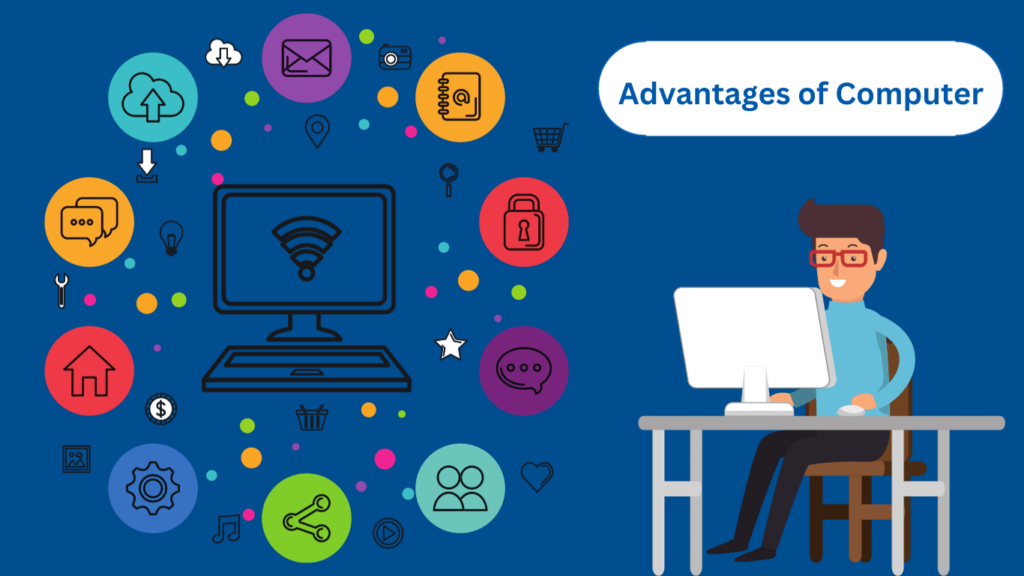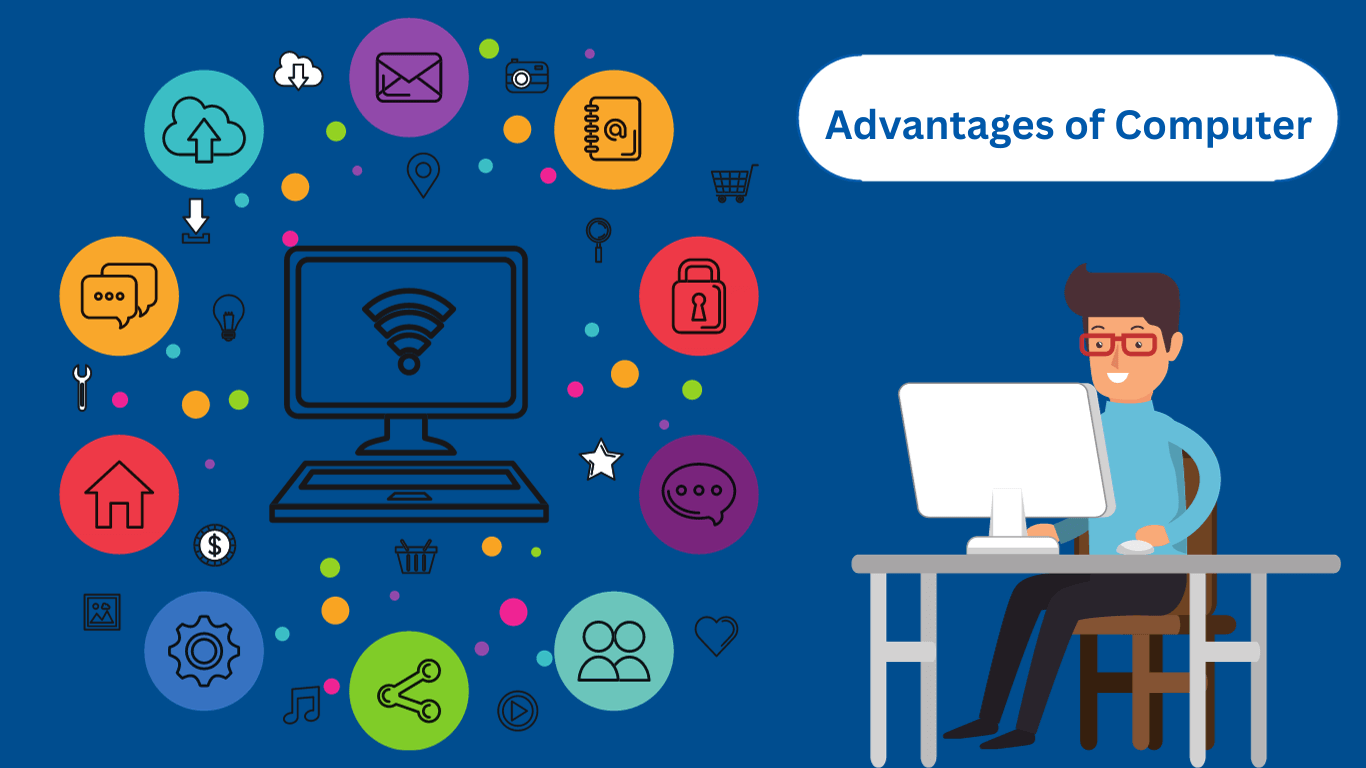Advantages of Computer : Computers have become an integral part of our lives, revolutionizing the way we work, learn, communicate, and entertain ourselves. The advantages they bring are endless, significantly increasing efficiency, productivity, connectivity, and innovation in various fields.

In this article, we will explore the remarkable benefits that computers offer and how they have transformed different aspects of our lives.
Advantages of Computer
1. Increased efficiency and productivity through computer usage
The use of computers has greatly improved efficiency and productivity in almost every industry. With the aid of powerful software applications and tools, tasks that used to take hours or even days to complete can now be accomplished within minutes. For instance, in the business sector, computerized accounting systems have simplified financial management, enabling organizations to streamline their operations and make informed decisions promptly.
Moreover, computers have revolutionized the way we store, retrieve, and share information. Gone are the days of laboriously searching through stacks of files and documents. Now, with just a few clicks, we can access a vast amount of data at our fingertips. This ease of information retrieval has unleashed the potential for faster decision-making and improved problem-solving.
Additionally, computers have automated numerous manual processes, saving time and reducing errors. From assembly lines in manufacturing to customer service in retail, automation has transformed industries, resulting in higher output and cost savings. The use of sophisticated algorithms and artificial intelligence has further enhanced efficiency, allowing computers to perform complex tasks with precision and speed.
2. Education and learning opportunities with computers
Computers have revolutionized the way we acquire knowledge and learn. The internet, in particular, has opened up a world of educational resources and opportunities. With just a few keystrokes, we can access a vast array of online courses, tutorials, and educational materials from renowned institutions and experts around the globe.
E-learning platforms have gained popularity, enabling individuals to learn at their own pace and convenience. Whether it’s acquiring new skills, pursuing higher education, or simply expanding one’s knowledge, computers have made education accessible to all. Moreover, interactive learning software and applications have transformed traditional classrooms, making education more engaging and personalized.
The advantages of computers in education go beyond accessibility. They offer tools for research, analysis, and collaboration, enhancing critical thinking and problem-solving skills. Students can now collaborate with peers in different parts of the world, exchanging ideas and perspectives, transcending geographical boundaries.
3. Communication and connectivity facilitated by computers
Communication has been revolutionized by computers, connecting people across the globe like never before. Email, instant messaging, and video conferencing have made communication faster, more efficient, and more cost-effective. Distance is no longer a barrier, enabling businesses to expand internationally and allowing friends and families to stay connected regardless of their physical location.
Social media platforms have further transformed communication, providing a space for individuals to connect, share ideas, and express themselves. It has become a powerful tool for networking, marketing, and social activism, bringing people together for common causes and initiatives.
Furthermore, computers have facilitated the creation and sharing of multimedia content, such as photos, videos, and music. With the rise of social media platforms and online streaming services, individuals can express their creativity, share their experiences, and entertain others on a global scale.
4. The impact of computers on the business world
Computers have had a profound impact on the business world, transforming the way organizations operate and compete. From small startups to multinational corporations, businesses rely on computers for various functions, including communication, data storage, marketing, and customer relationship management.
E-commerce has experienced exponential growth, thanks to computers and the internet. Online shopping has become the norm, offering convenience, a wider range of products, and competitive prices. Businesses can now reach customers globally, expanding their market reach and boosting sales.
Moreover, computers have revolutionized the way businesses analyze and utilize data. Through data analytics and business intelligence tools, organizations can gain valuable insights into consumer behavior, market trends, and operational efficiency. This enables them to make data-driven decisions, optimize processes, and gain a competitive edge.
Computerized inventory management systems have also revolutionized supply chain management, ensuring efficient stock control, reducing waste, and minimizing costs. Additionally, customer relationship management software has improved customer service, enabling businesses to personalize interactions, anticipate needs, and foster long-term loyalty.
5. Entertainment and leisure activities enhanced by computers
Computers have transformed the world of entertainment and leisure, offering a wide range of options that cater to diverse interests and preferences. The advent of computer graphics and multimedia technology has revolutionized the gaming industry, creating immersive and realistic virtual worlds.
Furthermore, computers have democratized the creation and distribution of music, movies, and other forms of entertainment. Anyone with a computer and creative talent can produce and share their work with a global audience. Streaming platforms have made entertainment accessible, allowing us to enjoy movies, TV shows, and music on-demand, anytime, and anywhere.
Moreover, computers have opened up new avenues for creativity and self-expression. Digital art, photography, and graphic design have gained popularity, enabling individuals to unleash their artistic potential. Social media platforms have become a hub for sharing and discovering creative content, fostering a vibrant online culture.
6. Healthcare advancements driven by computer technology
Computers have revolutionized the healthcare industry, enabling significant advancements in diagnosis, treatment, and patient care. Electronic medical records have replaced traditional paper-based systems, ensuring accurate and efficient management of patient information. This has streamlined healthcare processes, reduced errors, and improved patient safety.
Medical imaging technologies, such as computed tomography (CT) scans, magnetic resonance imaging (MRI), and ultrasound, have become indispensable tools for diagnosing and monitoring diseases. These imaging techniques, powered by computer algorithms, provide detailed and precise images, aiding healthcare professionals in making accurate diagnoses and treatment plans.
Furthermore, computers have played a crucial role in the development of telemedicine, bringing healthcare services to remote areas and underserved populations. Through video conferencing and remote monitoring, patients can receive medical advice and consultations from specialists regardless of their geographical location. This has improved access to healthcare, particularly in rural areas.
Additionally, computer-assisted surgeries have transformed the field of surgery, enabling more precise and minimally invasive procedures. Surgical robots and computer-guided systems assist surgeons in performing complex surgeries with enhanced precision, reducing risks and improving patient outcomes.
7. The role of computers in scientific research and innovation
Computers have become indispensable tools in scientific research, fueling innovation and discoveries across various disciplines. They have revolutionized data analysis, simulation, and modeling, allowing scientists to tackle complex problems and gain insights into natural phenomena.
Computational biology, for instance, has emerged as a powerful field of study, leveraging computer algorithms and models to analyze biological data and unravel the mysteries of life. Genomic sequencing, protein folding simulations, and drug discovery are just a few areas where computers have accelerated scientific breakthroughs.
Moreover, computers have enabled scientists to conduct large-scale experiments and simulations that would be impossible or impractical in the physical world. Climate modeling, for example, relies on supercomputers to simulate complex weather patterns and predict climate change. This aids in developing strategies to mitigate the impact of climate change and inform policy decisions.
Computers have also facilitated collaboration among scientists worldwide. Through online platforms and shared databases, researchers can share data, collaborate on projects, and exchange knowledge, accelerating the pace of scientific discovery.
Conclusion: Embracing the advantages of computer for a brighter future
As we have explored in this article, computers have revolutionized various aspects of our lives, from education and communication to business, entertainment, healthcare, and scientific research. Their countless advantages have transformed the way we work, learn, connect, and innovate. Embracing computers and their potential can lead us to a brighter future, where efficiency, connectivity, and creativity thrive.
It is crucial for individuals, businesses, and governments to recognize and harness the advantages that computers offer. Investing in computer education, infrastructure, and research can pave the way for continued advancements and ensure that we fully leverage the potential of this powerful tool.
In conclusion, computers have become an indispensable part of our lives, opening up endless possibilities and shaping our future. By embracing the advantages they bring, we can navigate the complexities of the modern world, drive innovation, and create a better future for generations to come.

